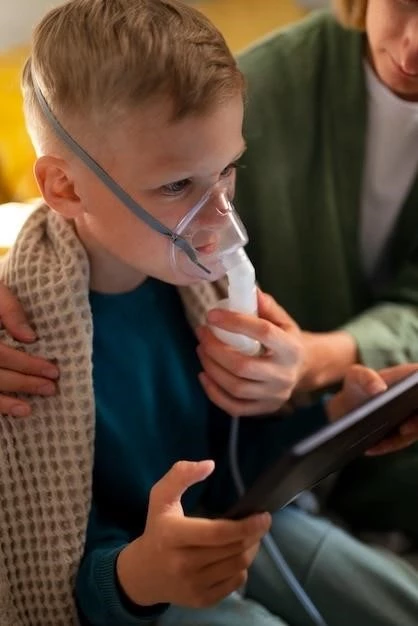Symptoms of Congenital Central Hypoventilation Syndrome (CCHS)
- Respiratory Symptoms
- Gastrointestinal Symptoms
- Neurological Symptoms
Respiratory Symptoms
Individuals with Congenital Central Hypoventilation Syndrome may experience shallow breathing‚ especially during sleep‚ leading to low oxygen levels and high carbon dioxide levels in the blood. This can result in fatigue‚ poor growth‚ and difficulty concentrating. Regular monitoring and timely intervention are crucial for managing respiratory symptoms.
Gastrointestinal Symptoms
Some individuals with Congenital Central Hypoventilation Syndrome may experience feeding difficulties‚ gastroesophageal reflux‚ and constipation. It is essential to work closely with healthcare providers to address these gastrointestinal symptoms promptly. Adequate nutrition and hydration are vital for overall well-being. Creating a consistent feeding plan and monitoring any digestive issues can help manage gastrointestinal symptoms effectively.
Neurological Symptoms
Individuals with Congenital Central Hypoventilation Syndrome may experience neurological issues such as difficulty with learning‚ memory‚ and attention. It is important to address these symptoms early by working with educational specialists and healthcare professionals. Developing strategies to support cognitive function and optimize learning experiences can significantly improve the quality of life for individuals with CCHS.
Treatment options for CCHS
- Ventilatory Support
- Medication
- Surgery
Ventilatory Support
For individuals with Congenital Central Hypoventilation Syndrome‚ ventilatory support such as continuous positive airway pressure (CPAP)‚ bilevel positive airway pressure (BiPAP)‚ or mechanical ventilation may be necessary during sleep to ensure adequate oxygen levels. Consult a pulmonologist to determine the most suitable ventilatory support option based on individual needs and severity of symptoms.
Medication
Medication for Congenital Central Hypoventilation Syndrome may include drugs to manage symptoms like gastroesophageal reflux‚ constipation‚ or neurological issues. Consult a healthcare provider for proper evaluation and prescription of medications tailored to individual needs. Adhering to the medication regimen is crucial for managing symptoms effectively and improving overall quality of life.
Surgery
Surgery may be considered in some cases of Congenital Central Hypoventilation Syndrome to address specific issues like gastroesophageal reflux or certain airway abnormalities. It is essential to consult with a multidisciplinary team of healthcare professionals‚ including a surgeon specializing in CCHS‚ to evaluate the benefits and risks of surgical intervention. Prioritize thorough discussions and informed decision-making before proceeding with any surgical procedures.
Living with CCHS⁚ Tips for daily management
- Monitoring
- Creating a Safe Environment
Monitoring
Regular monitoring of vital signs‚ oxygen saturation levels‚ and overall respiratory function is crucial for individuals living with Congenital Central Hypoventilation Syndrome. Keeping a detailed record of symptoms and sharing this information with healthcare providers can aid in adjusting treatment plans as needed. Stay vigilant and proactive in monitoring health indicators to ensure early detection and management of any changes in condition.
Creating a Safe Environment
Ensuring a safe environment for individuals with Congenital Central Hypoventilation Syndrome involves measures such as maintaining proper ventilation in living spaces‚ reducing exposure to potential respiratory irritants‚ and implementing safety precautions during sleep. It is vital to work closely with healthcare professionals to address specific needs and create a supportive environment that promotes optimal respiratory health and overall well-being.
Genetic causes of Congenital Central Hypoventilation Syndrome
- PHOX2B Gene Mutation
PHOX2B Gene Mutation
The PHOX2B gene mutation is the primary genetic cause of Congenital Central Hypoventilation Syndrome. This mutation affects the development of the autonomic nervous system‚ particularly the control of breathing. Understanding the genetic basis of CCHS through testing and genetic counseling can provide valuable insights for treatment strategies and family planning decisions. Consult with healthcare providers for comprehensive genetic evaluation and guidance.
CCHS in children⁚ What parents need to know
- Early Signs
- Support Networks
Early Signs
Parents should be vigilant for early signs of Congenital Central Hypoventilation Syndrome in children‚ such as labored breathing‚ bluish skin‚ poor growth‚ and excessive sleepiness. Timely recognition of these symptoms is crucial for prompt evaluation by healthcare professionals and initiation of appropriate interventions. Keep a watchful eye on your child’s respiratory patterns and seek medical attention if you notice any concerning signs.
Support Networks
Connecting with support networks can provide valuable guidance and emotional support for parents of children with Congenital Central Hypoventilation Syndrome. Engage with healthcare professionals‚ online forums‚ and advocacy groups to access resources‚ share experiences‚ and learn about coping strategies. Building a strong support network can help parents navigate the challenges of caring for a child with CCHS and promote a sense of community and understanding.
Latest research advancements in CCHS treatment
- Stem Cell Therapy
Stem Cell Therapy
Stem cell therapy is an emerging research focus for the treatment of Congenital Central Hypoventilation Syndrome. By exploring the potential of stem cells to repair or regenerate damaged tissues in the respiratory system‚ researchers aim to develop innovative therapeutic approaches. Stay informed about advancements in stem cell therapy for CCHS through reputable sources and consult with healthcare providers to explore potential treatment options.

CCHS awareness and advocacy efforts
- Awareness Campaigns
- Advocacy Organizations
Awareness Campaigns
Participating in CCHS awareness campaigns can help educate the public and healthcare community about this rare condition‚ its symptoms‚ and the importance of early diagnosis. By sharing personal stories‚ raising funds for research‚ and engaging in awareness events‚ you can contribute to increasing understanding and support for individuals with Congenital Central Hypoventilation Syndrome.
Advocacy Organizations
Joining advocacy organizations dedicated to Congenital Central Hypoventilation Syndrome can provide valuable support‚ resources‚ and a sense of community for individuals and families affected by CCHS. These organizations work to raise awareness‚ support research initiatives‚ and advocate for policies that benefit those living with CCHS. Get involved‚ stay informed‚ and connect with advocacy groups to make a positive impact in the CCHS community.
Coping strategies for individuals with CCHS
- Mental Health Support
- Lifestyle Adjustments
Mental Health Support
Mental health support is essential for individuals with Congenital Central Hypoventilation Syndrome to cope with the emotional impacts of the condition. Consider seeking counseling‚ joining support groups‚ and practicing relaxation techniques to manage stress and anxiety. Prioritize self-care and open communication with loved ones to maintain mental well-being while navigating the challenges of living with CCHS.
Lifestyle Adjustments
Making lifestyle adjustments can help individuals with Congenital Central Hypoventilation Syndrome improve their overall well-being. Establishing a regular sleep routine‚ maintaining a healthy diet‚ staying physically active within safe limits‚ and avoiding respiratory irritants are essential. Work closely with healthcare providers to develop a personalized lifestyle plan that supports respiratory health and enhances quality of life while managing CCHS.
